- Home
- V. S. Naipaul
The Middle Passage
The Middle Passage Read online
V. S. Naipaul
The Middle Passage
V. S. Naipaul was born in Trinidad in 1932. He went to England on a scholarship in 1950. After four years at Oxford he began to write, and since then he has followed no other profession. He is the author of more than twenty books of fiction and nonfiction and the recipient of numerous honors, including the Nobel Prize in 2001, the Booker Prize in 1971 and a knighthood for services to literature in 1990. He lives in Wiltshire, England.
Also by V. S. Naipaul
NONFICTION
Between Father and Son: Family Letters
Beyond Belief: Islamic Excursions Among the Converted Peoples
India: A Million Mutinies Now
A Turn in the South
Finding the Center
Among the Believers
The Return of Eva Peron (with The Killings in Trinidad)
India: A Wounded Civilization
The Overcrowded Barracoon
The Loss of El Dorado
An Area of Darknes
FICTION
Half a Life
A Way in the World
The Enigma of Arrival
A Bend in the River
Guerrillas
In a Free State
A Flag on the Island
Mr. Stone and the Knights Companion
A House for Mr. Biswas
Miguel Street
The Suffrage of Elvira
The Mystic Masseur
VINTAGE BOOKS EDITION, JANUARY 2002
Copyright © 1962, copyright renewed 1990, by V. S. Naipaul
All rights reserved under International and Pan-American Copyright Conventions. Published in the United States by Vintage Books, a division of Random House, Inc., New York. Originally published in hardcover in Great Britain by Andre Deutsch Limited, London, in 1962. First published in hardcover in the United States by Macmillan, New York, in 1963. Published in trade paperback by Vintage Books in 1981.
Vintage and colophon are registered trademarks of Random House, Inc.
Library of Congress Cataloging-in-Publication Data
Naipaul, V. S. (Vidiadhar Surajprasad), 1932–
The middle passage : impressions of five societies—British, French, and Dutch—in the West Indies and South America / V. S. Naipaul.
p. cm.
Originally published: London : A. Deutsch, 1962.
eISBN: 978-0-307-77653-2
1. West Indies—Description and travel. 2. South America—Description and travel.
3. Naipaul, V. S. (Vidiadhar Surajprasad), 1932– —Journeys—West Indies.
4. Naipaul, V. S. (Vidiadhar Surajprasad), 1932– —Journeys—South America. I. Title.
F1612 .N35 2002
972.905′2—dc21
2001040848
www.vintagebooks.com
v3.1
Contents
Cover
About the Author
Other Books by This Author
Title Page
Copyright
Map
Foreword to this Edition
Chapter 1 - Middle Passage
Chapter 2 - Trinidad
Chapter 3 - British Guiana
Chapter 4 - Surinam
Chapter 5 - Martinique
Chapter 6 - On to Jamaica
Foreword to this Edition
The Middle Passage was my first travel book. It was published in 1962, and this is from the original foreword:
In September 1960 I went back to Trinidad on a three-month scholarship granted by the Government of Trinidad and Tobago. While I was in Trinidad the Premier, Dr Eric Williams, suggested that I write a nonfiction book about the Caribbean. I hesitated. The novelist works towards conclusions of which he is often unaware; and it is better that he should. However, I decided to take the risk.
In 1969 I added this note:
A New Zealand writer, reviewing another book of mine, said that I was writing about the problems of a client culture and a client economy. I wish those precise words had occurred to me when I was writing The Middle Passage. They would have made many things more clear. The book might have had more shape; and it might have been less romantic about the healing power, in such a culture, of political or racial assertion.
With the qualification contained in that note, the book, I feel, still stands. Perhaps because it was the first time I had truly ‘travelled’, both the travel and the writing remain vivid to me; and — though the themes are serious — I hope that there are readers who will also catch, and respond to, the element of simple delight.
They were valued only for the wealth which they yielded, and society there has never assumed any particularly noble aspect. There has been splendour and luxurious living, and there have been crimes and horrors, and revolts and massacres. There has been romance, but it has been the romance of pirates and outlaws. The natural graces of life do not show themselves under such conditions. There has been no saint in the West Indies since Las Casas, no hero unless philonegro enthusiasm can make one out of Toussaint. There are no people there in the true sense of the word, with a character and purpose of their own.
James Anthony Froude: The English in the West Indies (1887)
1. MIDDLE PASSAGE
In the carriage with me were several gentlemen; officers going out to join their regiments; planters who had been home on business; young sportsmen with rifles and cartridge cases who were hoping to shoot alligators, &c., all bound like myself for the West Indian mail steamer. The elders talked of sugar and of bounties, and of the financial ruin of the islands.
James Anthony Froude: The English in the West Indies (1887)
THERE WAS SUCH a crowd of immigrant-type West Indians on the boat-train platform at Waterloo that I was glad I was travelling first class to the West Indies. It wasn’t an expensive first class. Ninety-four pounds, which might have bought cabin-class accommodation on one of the ships of the French Line, had got me a cabin to myself on the Spanish immigrant ship Francisco Bobadilla.
Most of the people on the platform and many of those in the train were not travelling down to Southampton. But the compartment I got into remained crowded. One man with a Nat King Cole hairstyle was dandling a fat bonneted baby that was gift-wrapped in ribbons and frills, with a rubber nipple stuck like a gag and a final flourish in its drooping, dripping mouth. Two ladies with felt hats and pink stockings sat slumped against the window. They wore gauze-like dresses over satin petticoats of a fiery pink. The powder on their faces had dissolved in patches, and they crumpled tiny embroidered handkerchiefs in large shining hands. They looked constrained and unhappy. There were baskets with food and baby-supplies on the rack and on the floor.
The man with the baby was talking to the man opposite him of the hardships of life in London.
‘Is like that Stork on television,’ he said. ‘Three out of five can’t tell the difference from butter. Three out of five don’t care for you.’
He spoke in a slow, negligent way. The slumped women stared out of the window and said nothing. The baby, fat-cheeked, big-eyed, dribbled. London rolled away on either side of the railway canyon: the grimy backs of houses, the red tops of buses, the bright new advertisements, the signs on small shops, the men in white overalls on ladders: pictures that already felt like memories: the promised land from which we were already separated: the train just another of the morning noises.
‘Eh! I tell you about the foreman?’ He spoke easily; the train was not England. ‘One day he say, “Blackie, come here a minute.” I watch at him, and I say, “Good. I coming.” I went up and hit him baps! Clean through a glass window.’ He didn’t gesticulate. He was dandling the baby on his knee.
In the baby’s basket one saw the things of England, a few minutes ag
o commonplace, now the marks and souvenirs of the traveller: the bottle of Lucozade, the plastic baby bottle (in the West Indies it would have been a small rum bottle), the tin of baby powder.
‘Baps! Clean through the glass window.’
The ticket collector, tall and elderly, slid the compartment door open. On this train he was a foreigner, but his manner was neutral; he might have been on the Brighton train.
‘T’ank God, I didn’t have the monkey-wrench in my hand. I wouldn’t be sitting down in this train holding this baby on my lap today.’
The ticket collector examined and clipped, and slid the door shut.
From the next compartment a very tall and ill-made Negro stepped out into the corridor. The disproportionate length of his thighs was revealed by his thin baggy trousers. His shoulders were broad and so unnaturally square that they seemed hunched and gave him an appearance of fragility. His light grey jacket was as long and loose as a short topcoat; his yellow shirt was dirty and the frayed collar undone; his tie was slack and askew. He went to the window, opened the ventilation gap, pushed his face through, turned slightly to his left, and spat. His face was grotesque. It seemed to have been smashed in from one cheek. One eye had narrowed; the thick lips had bunched into a circular swollen protuberance; the enormous nose was twisted. When, slowly, he opened his mouth to spit, his face became even more distorted. He spat in slow, intermittent dribbles; and when he worked his face back in, his eyes caught mine.
I felt I had attracted his malevolence. And thereafter I couldn’t avoid this Negro with the ruined face. I went to the lavatory. Our eyes met, twice. I went looking for a buffet car. I saw him. There was no buffet car. On the way back I saw him. Next to him sat a much smaller Negro, in a grey coat as well, with big blank eyes as lack-lustre as boiled eggs, long arms and long hands, clumsily clenched, resting on his knees. His trousers were too short and rose tightly inches above his socks, so that he looked like a boy who had outgrown his clothes. His mouth was open. In the same compartment there was another Negro with the physique of a wrestler, and two young white men, one fat, one thin, both bald, in new sports jackets and sharply-creased flannels.
In my own compartment the baby was being fed. Its nose ran; its mouth leaked; it slurped and squelched and was frequently winded.
‘ “So you want rent?” ’ the baby-feeder was saying. ‘ “I tell you I ain’t paying any more than what I was paying before.” He say, “Blackie, I coming up to get my rent or to get you out of that room.” I watch at him and I say, “Good. Come up, bakra.” He come up. I give him one kick bam! He roll down the steps bup-bup-bup.
‘I pass round there last week. He gave up a big sign in green paint. Please No Coloured. In green paint. I tell you, man, is like Stork.’
At Southampton there was a further thinning out of passengers. The man with the Nat King Cole hairstyle was only seeing off his wife and baby; he himself was remaining behind to face aggressive landlords and foremen and Please No Coloured signs.
We were directed to one of the ocean terminal’s less luxurious waiting rooms, next to the railway sheds, in the gloomy recesses of which we could see the immigrants who had arrived that morning on the Francisco Bobadilla: a thick, multi-coloured mass herded behind wooden rails, and as silent as though they were behind glass. We stood at the doors and watched. No one stepped out of the travellers’ waiting room into the immigrants’ shed. There was interest, disapproval, pity and mockery in the gazes, the old hands sizing up the clothes of the new arrivals, clothes like those in which they had themselves landed some time before: thin white flannel trousers, sky-blue tropical suits, jackets with wide shoulders and long skirts, and those broad-brimmed felt hats, unknown in the West Indies yet de rigueur for the West Indian immigrant to Britain. Cheap cardboard suitcases were marked with complete addresses, all ending with ENGLAND in large letters. They stood motionless in the gloom; about them bustled dark-coated porters and railway officials; and there was silence.
The Negro with the ruined face stood, tall and totem-like, in the centre of the waiting room. Beside him was the stunted Negro with the short trousers, long arms and big eyes; from time to time he swivelled his head, his eyes never changing expression, his mouth open and collapsed, his large clumsy hands loosely clenched. The fat Englishman gave a cigarette to the man with the ruined face and lit it for him. There was much solicitude in this gesture, and I wondered about their relationship.
As yet we were subdued, as silent as the immigrants outside. But whispered rumours were beginning to circulate. Seven hundred, a thousand, twelve hundred immigrants had come on the Francisco Bobadilla. Two trains were taking them to London, from where they would make for those destinations written so proudly in those illiterate hands on their suitcases.
‘You wouldn’t want to travel with all them West Indians,’ the man at the travel agency had said. ‘Even the dockers are sick when they come off those ships. And it takes a lot to make a British docker sick.’
The Francisco Bobadilla was indeed in an appalling condition. The crew had not had time to clean up after the seven hundred immigrants. Paintwork was tarnished, metal rusting. In my first-class cabin, so cramped that I could open my suitcase only on my bunk, there was dust and fluff everywhere. The water carafe was hazy with dirt; the hot water didn’t run; the lights didn’t work. I rang for the steward; and many minutes later such an old, fatigued man appeared that I regretted disturbing him. I mentioned only the lights and the dust. He argued; I insisted; I mentioned the hot water.
‘Luego, luego,’ he said.
It was a more urgent word than mañana. When, some time later, I passed his cubby-hole, I saw him dozing on his chair.
But there was an advantage. On this outward journey there were few passengers, and most of those who lined the deck rails as we moved down the Solent were travelling tourist. When the dinner gong went they disappeared to their canteen below decks. There were only nine first-class passengers, and we sat at three tables in one corner of the large shabby dining room.
As he sat down, an elderly coloured man said, just to open the conversation, ‘A lot of these black fellers in Tobago are damn intelligent, you know.’
We were in the West Indies. Black had a precise meaning; I was among people who had a nice eye for shades of black. And the elderly coloured man – a man, that is, of mixed European and African descent, with features and skin-colour closer to the European – was safe. There were no black men or women at the table. The coloured man’s wife was, we were told, Spanish. Correia was a Portuguese from British Guiana. And Philip, who came from Trinidad, where he had ‘a little business’, could have been white or Portuguese or coloured or Jewish.
‘A lot of those black fellers in B.G. ain’t no fools either,’ Correia said.
The intelligence of black fellers in Trinidad and Jamaica and Barbados was assessed; and then they started groping for common acquaintances. It turned out that Correia and Philip had some, in a football team that had toured the West Indies in the 1920s.
Correia was a small, bald man. He wore spectacles, had a sharp hooked nose and had lost his teeth. But he was once a goalkeeper. He had a booming voice.
‘You remember Skippy?’ he asked.
‘I can’t remember when last I see Skippy,’ Philip said.
‘Well, you not going to see him again. Son of a bitch catch a pleurisy and dead. Frankie and Bertie and Roy Williams. All of them dead like hell.’
The waiter, middle-aged and mournful, couldn’t speak English.
‘But look at this, nuh,’ Correia boomed. ‘And I got to spend fo’teen days on this ship. Look here, man, look here. I want some tomatoes. You got that? Tomatoes. Having a lil trouble with the stomach,’ he explained to us. ‘Tomatoes. You got that? Me. Wantee. Tomatee. Me wantee tomatee. I don’t know where they pick up these people who can’t speak English.’
The Spanish lady couldn’t talk Spanish; Correia himself couldn’t talk Portuguese. West Indians are English-speaking and when
confronted with the foreigner display the language arrogance of all English-speaking people.
A young couple from Northern Ireland and an English librarian sat at the next table. The librarian was distressed. She had been under the impression that the Francisco Bobadilla was a cruise ship and had booked for the round trip. She had just learned that we were going to the West Indies to pick up another seven hundred immigrants.
When I went down I saw the old steward coming out of my cabin with brush and pan. He smiled and limped away. But the floor was still dusty; the balls of fluff were still under my bunk; the carafe was still dirty; the hot water didn’t run. I couldn’t complain, though: the lights were now working.
Early next morning I was awakened by Correia. He had the cabin across the corridor from mine. He came into my cabin naked except for a pair of pants. He was without his spectacles; his little face was haggard; his beard had begun to sprout; his thin hair was disarrayed; and he was hugging himself.
‘Hi there, man. How you sleep? Lemme see a cigarette, nuh.’ He took one of mine and lit it. ‘You look as if you sleep well, you know. I had a hell of a night, boy. Didn’t want to wake you up earlier. Thought you would be sleeping. But I can’t open my suitcase. The one with pyjamas and soap and razor and Eno’s and every blasted thing in. You want to try it?’
The canvas suitcase was bulging and taut; it was a wonder that Correia had managed to close it.
‘I try those blasted keys all how,’ he said, sitting on his bunk, while I tried.
Eventually we opened it, Correia jumping on the suitcase, I turning the key.
‘Thanks, thanks, man. I hope I ain’t catch a cold, boy. You ain’t have a lil Eno’s or Andrews with you? Stomach giving me hell, boy. Went three times already this morning. Not one blasted thing. Is this damn mañana food. First and last Spanish ship you catch me on.
And all that morning he padded up and down outside the lavatories, smoking, head bowed as if in meditation, tie slackened, spectacles half-way down his nose, hands in pockets. Whenever I went down he gave me a progress report.

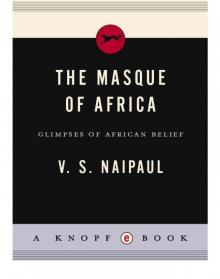 The Masque of Africa: Glimpses of African Belief
The Masque of Africa: Glimpses of African Belief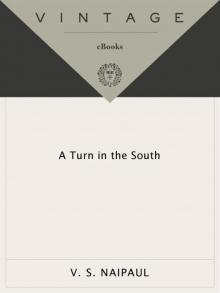 A Turn in the South
A Turn in the South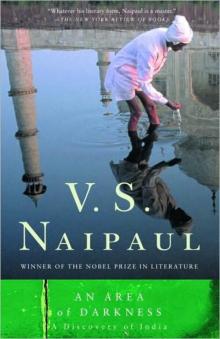 An Area of Darkness
An Area of Darkness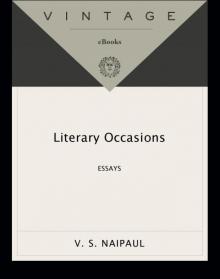 Literary Occasions: Essays
Literary Occasions: Essays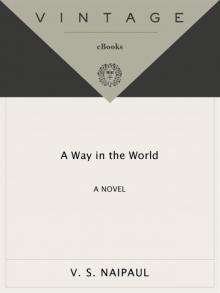 A Way in the World
A Way in the World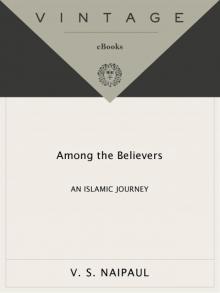 Among the Believers: An Islamic Journey
Among the Believers: An Islamic Journey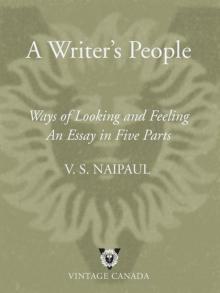 A Writer's People: Ways of Looking and Feeling
A Writer's People: Ways of Looking and Feeling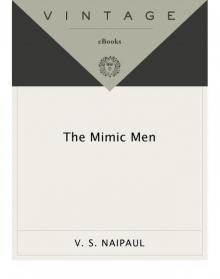 The Mimic Men: A Novel
The Mimic Men: A Novel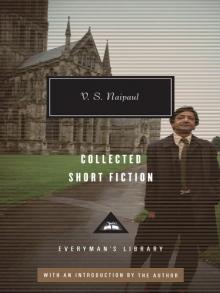 Collected Short Fiction
Collected Short Fiction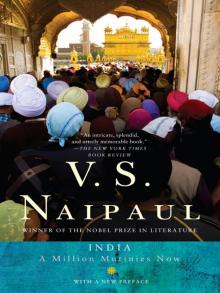 India: A Million Mutinies Now
India: A Million Mutinies Now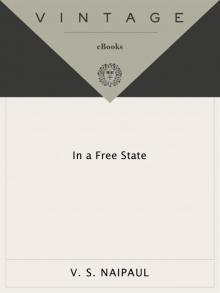 In a Free State
In a Free State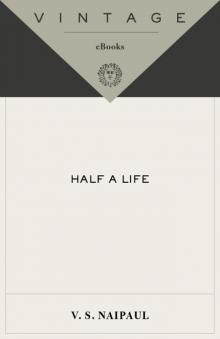 Half a Life
Half a Life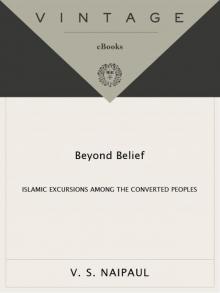 Beyond Belief: Islamic Excursions Among the Converted Peoples
Beyond Belief: Islamic Excursions Among the Converted Peoples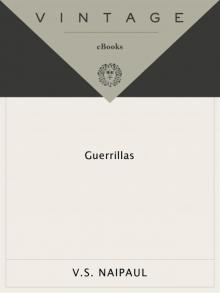 Guerrillas
Guerrillas A House for Mr. Biswas
A House for Mr. Biswas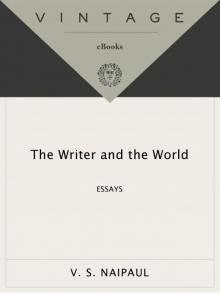 The Writer and the World: Essays
The Writer and the World: Essays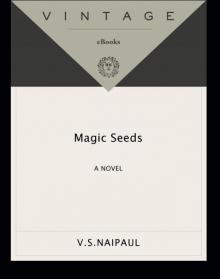 Magic Seeds
Magic Seeds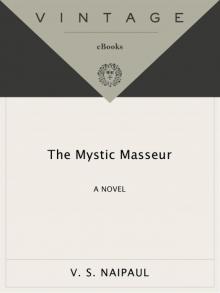 The Mystic Masseur
The Mystic Masseur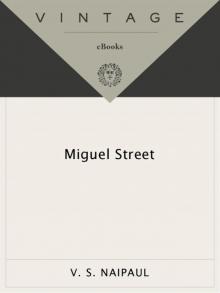 Miguel Street
Miguel Street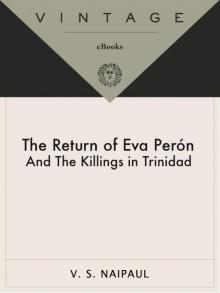 The Return of Eva Perón, With the Killings in Trinidad
The Return of Eva Perón, With the Killings in Trinidad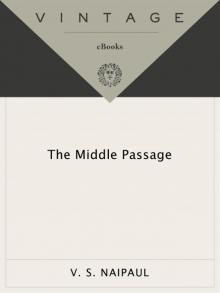 The Middle Passage
The Middle Passage A Bend in the River
A Bend in the River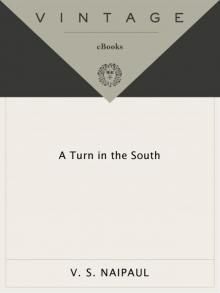 A Turn in the South (Vintage International)
A Turn in the South (Vintage International)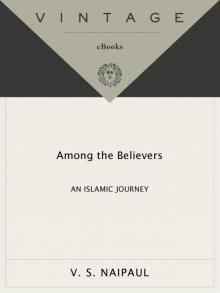 Among the Believers
Among the Believers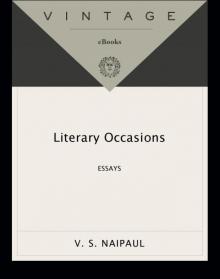 Literary Occasions
Literary Occasions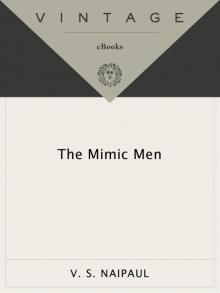 The Mimic Men
The Mimic Men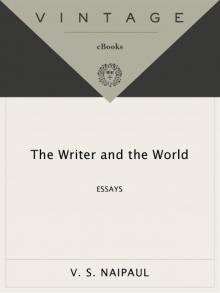 The Writer and the World
The Writer and the World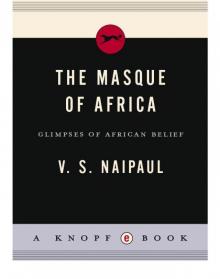 The Masque of Africa
The Masque of Africa